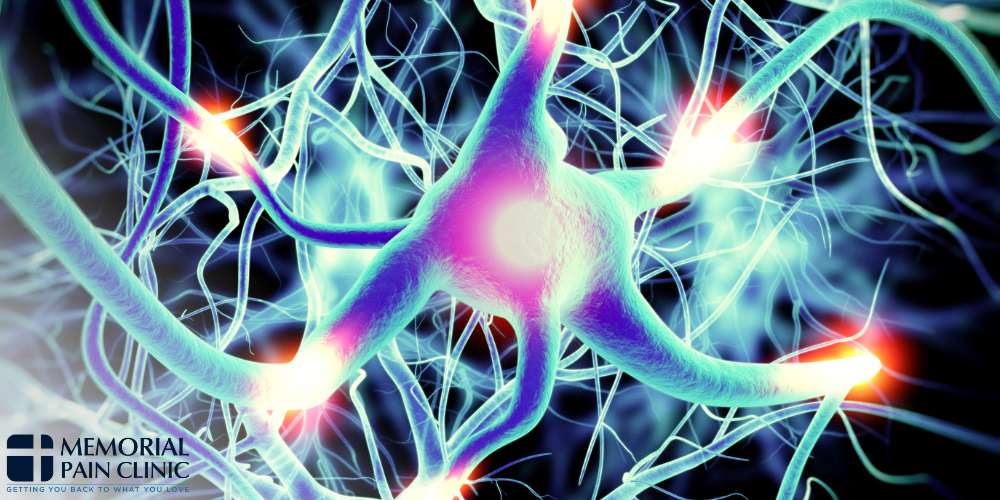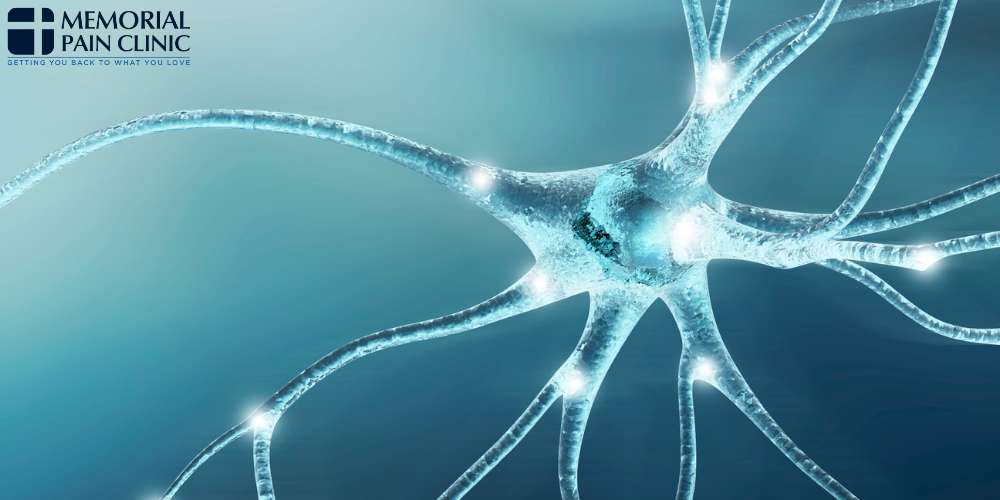Nerve Injury Treatment Tulsa, OK
Our Services

Navigating nerve injury can be a daunting experience, impacting daily life with symptoms like sharp pain, tingling sensations, or muscle weakness. At Memorial Pain Clinic in Tulsa, OK, we specialize in comprehensive treatments tailored to alleviate and manage nerve pain effectively.
Whether you’re dealing with carpal tunnel syndrome, sciatica, or peripheral neuropathy, our dedicated team of pain management specialists is here to provide compassionate care and personalized treatment plans. To schedule an appointment for nerve damage treatment in Tulsa, please call our office at 918-200-9944 today.
What Is Nerve Damage?
Nerve damage, also known as neuropathy, occurs when nerves are injured or impaired, disrupting the transmission of signals between the brain, spinal cord, and the rest of the body. The peripheral nervous system innervates much of the body, which means many nerve injuries are peripheral nerve injuries.
Nerve Damage Symptoms
A peripheral nerve injury can have many symptoms, including the following.
- Pain (sharp, burning, or stabbing)
- Numbness
- Tingling or “pins and needles” sensations
- Muscle weakness
- Sensitivity to touch
- Loss of coordination
- Muscle wasting
- Paralysis, in severe cases
- Difficulty with motor skills
- Autonomic symptoms, such as changes in blood pressure or heart rate and digestive issues
What Does Nerve Pain Feel Like?
Nerve pain often feels like a sharp, burning, or stabbing sensation. It can be accompanied by tingling or a “pins and needles” feeling. The pain from peripheral nerve damage might be constant or intermittent, and it may intensify with touch or changes in temperature.
What Are the First Signs of Nerve Damage?
The first signs of nerve damage often include numbness, tingling, or a “pins and needles” sensation in the affected area. Other early symptoms may be unexplained pain, muscle weakness, and increased sensitivity to touch. These symptoms might initially be mild but can progressively worsen if the underlying cause is not addressed.
What Are the Most Common Nerve Injuries?

Your central nervous system in your brain and spinal cord branches out and reaches every square inch of your body through your peripheral nerves, where most nerve injuries occur.
Any time you cut or burn yourself, you damage the tiny nerves in the affected area. For the most part, these neural pathways recover and grow back very quickly. With larger injuries, however, the damage can be far more significant, causing chronic and serious problems with function and pain.
Nerve Pain in Leg
Nerve injuries originating in the leg can lead to severe pain. In many cases, symptoms result from damage to the peroneal nerve. Some common causes of peroneal nerve pain include the following.
- Injuries or trauma to the knee
- Fibula fractures
- Wearing leg casts that are too tight
- Injuries during knee surgery
- Certain autoimmune conditions, like polyarteritis nodosa, diabetes, excessive alcohol use, or other nerve disorders
Nerve Pain in Foot
When patients feel pain in their feet, this is often known as neuropathic pain. Some common causes of neuropathic pain in the feet include the following.
- Morton’s neuroma
- Tarsal tunnel syndrome
- Peroneal neuropathy
- Baxter’s nerve entrapment
Nerve Damage in Hand
In hand, nerve pain can result from mild nerve injuries or more serious injuries to the median nerve. Some common nerve injuries in the hands include the following.
- Carpal tunnel syndrome
- Cubital tunnel syndrome
- Diabetes
- Multiple sclerosis
- Arthritis
What Causes Nerve Damage?
There are almost countless ways you can injure or damage your nerves, but the most common are:
- Injuries, such as deep lacerations and fractures that sever your nerves
- Systemic conditions, such as diabetes, peripheral neuropathy, or fibromyalgia
- Compression issues, such as a herniated disc or tennis elbow
- Crushed nerves due to trauma
How Are Nerve Injuries Diagnosed?
To diagnose injuries to motor and sensory nerves, we use a combination of medical history reviews, physical examinations, and specialized tests. During the medical history review, your doctor will ask about the onset, nature, and progression of symptoms, as well as any potential causes, such as trauma, repetitive activities, or underlying health conditions. The physical examination involves assessing muscle strength, reflexes, and sensory responses to identify areas of numbness, tingling, or weakness.
Specialized diagnostic tests are often used to confirm the diagnosis and determine the extent of nerve damage. Electromyography (EMG) and nerve conduction studies (NCS) measure the electrical activity in muscles and the speed of nerve signal transmission, respectively. Imaging tests like MRI or CT scans can help visualize any structural causes of nerve compression, such as herniated discs or bone spurs. Blood tests might also be conducted to check for underlying conditions like diabetes or vitamin deficiencies that can contribute to neuropathy.
Can Nerve Damage Be Repaired?
Nerve damage can sometimes be repaired, depending on the type and extent of the injury. Peripheral nerves have a limited ability to regenerate, and minor injuries may heal on their own over time with appropriate treatment, such as rest, physical therapy, and medications to manage pain and inflammation.
In cases of severe or persistent nerve damage, surgical intervention may be necessary to repair or graft the damaged nerve. However, the success of peripheral nerve surgery can vary, and complete recovery is not always possible, especially if the damage has been extensive or prolonged. In these cases, providers often focus on helping patients relieve nerve pain if irreversible damage occurs.
Is Nerve Damage Permanent?
Nerve damage can be permanent, but it is not always so. The potential for recovery depends on the severity and type of nerve injury. Mild nerve damage may heal over time with proper treatment and care, as peripheral nerves have some capacity to regenerate. However, severe or prolonged nerve damage, particularly in the central nervous system, is often irreversible.
Early intervention, including medications, physical therapy, and sometimes surgery, can improve the chances of recovery and reduce the risk of permanent damage. Nonetheless, in some cases, even with treatment, complete recovery may not be achievable.
Nerve Pain Treatment in Tulsa, OK

Treating nerve pain often goes beyond just physical therapy and periods of rest. Depending on the severity of a patient’s pain and the underlying cause, doctors may opt for the following treatment options.
Nerve Pain Medication
Medications are commonly used to alleviate pain from peripheral nerve damage. Over-the-counter pain relievers like acetaminophen or nonsteroidal anti-inflammatory drugs (NSAIDs) can help with mild pain. For more severe nerve pain, doctors may prescribe stronger medications such as anticonvulsants (e.g., gabapentin or pregabalin), antidepressants (e.g., amitriptyline or duloxetine), or opioid analgesics in more extreme cases. Topical treatments, such as lidocaine patches or capsaicin creams, can also provide localized relief.
What Is the Strongest Drug for Nerve Pain?
The strongest drugs for nerve pain are typically opioid analgesics, such as morphine, oxycodone, or hydrocodone. These medications are potent and can provide significant pain relief, but they are generally reserved for very severe cases of nerve pain.
For chronic nerve pain, doctors often prefer other medications like anticonvulsants (e.g., gabapentin, pregabalin) and certain antidepressants (e.g., amitriptyline, duloxetine), which can be effective and have a more favorable risk profile for long-term use.
Nerve Block Injection
In Tulsa, nerve block injections are another option for managing nerve pain from peripheral nerve injuries. These involve injecting an anesthetic or steroid directly into the affected area to block pain signals. Nerve blocks can provide significant pain relief, especially in cases where the pain is localized and severe. This method is often used for diagnostic purposes to identify the specific nerve causing the pain and to relieve pain temporarily, which can last from a few hours to several months.
Transcutaneous Electrical Nerve Stimulation (TENS)
Transcutaneous electrical nerve stimulation (TENS) is a non-invasive treatment that uses low-voltage electrical currents to relieve pain from a peripheral nerve injury. During TENS therapy, electrodes placed on the skin deliver electrical impulses to the affected nerves, which can help disrupt pain signals and promote the release of endorphins, the body’s natural painkillers. TENS is typically used for chronic pain conditions and can be a useful adjunct to other pain management strategies.
Nerve Decompression Surgery
For some patients, nerve decompression surgery may be necessary, especially if nerve pain is caused by compression from a herniated disc, bone spur, or other structural issues. This surgical procedure aims to relieve pressure on the affected nerve by removing the source of compression.
Common types of nerve decompression surgeries include carpal tunnel release, for median nerve compression in the wrist, lumbar laminectomy, for sciatic nerve compression in the lower back, and nerve grafting to repair damaged nerves. Surgery can be highly effective, though it is usually considered only after conservative treatments have failed.
While the providers at Memorial Pain Clinic do not offer surgical pain solutions, we can recommend exceptionally talented surgeons in the area who may be able to surgically treat severe nerve injuries.
Contact Memorial Pain Clinic for Nerve Pain Relief in Tulsa, OK

At Memorial Pain Clinic in Tulsa, OK, our mission is to empower you on your journey towards relief from nerve pain. With a commitment to excellence in pain management, our team utilizes the latest advancements and compassionate care to address the root causes of nerve injuries.
Whether you’re seeking non-invasive therapies like nerve block injections and transcutaneous electrical nerve stimulation (TENS), or considering surgical options for nerve decompression, we are here to support you every step of the way. Take the first step towards a life with less pain—schedule a consultation with our experts today and let us help you reclaim your comfort and vitality.
